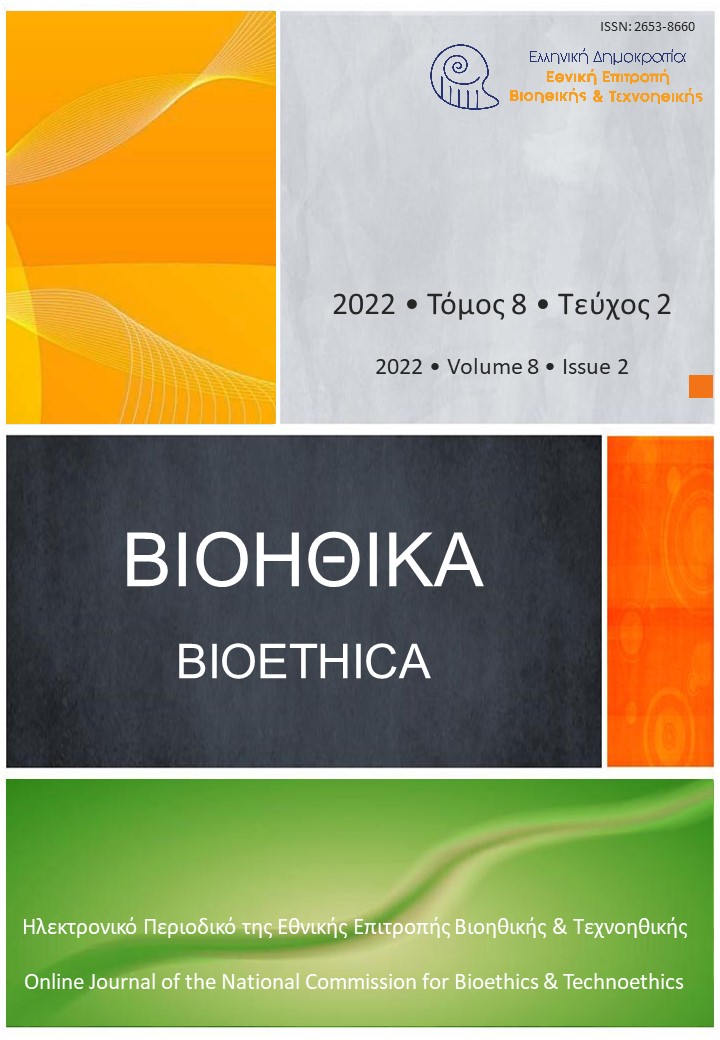Οικονομικά κίνητρα για τον εμβολιασμό έναντι της νόσου Covid - 19. Μια βιοηθική προσέγγιση

Περίληψη
Η θέσπιση οικονομικών κινήτρων στο πλαίσιο της εκστρατείας εμβολιασμού έναντι της νόσου Covid-19, ως μέσο πειθούς του ανεμβολίαστου πληθυσμού παγκοσμίως, εγείρει τον βιοηθικό προβληματισμό αναφορικά με την εναρμόνιση του μέτρου με τις βασικές βιοηθικές αρχές αλλά και ως προς την ηθική του βάση. Στην παρούσα ανάλυση καταρχάς, εισφέρονται επιχειρήματα περί της υπονόμευσης της αρχής της αυτονομίας, καθώς το μέτρο μπορεί να εκληφθεί ως εξωτερική πίεση και έμμεσος εξαναγκασμός που χειραγωγεί την ατομική συναίνεση και φαλκιδεύει την ελεύθερη συνειδητή επιλογή. Ταυτόχρονα, με την εφαρμογή του, αναφύονται ζητήματα εκμετάλλευσης και έλλειψης σεβασμού των υποκειμένων, ενώ αμφισβητείται εκ νέου η συμβατότητά του τόσον με την αρχή της ωφέλειας υπό μια ευρεία έννοια, -εστιάζοντας τόσο στην ηθική όσο και την κοινωνική επισφάλειά του-, όσον και με την αρχή της δικαιοσύνης, καθόσον ανακινεί ζητήματα ανισότητας και συμπεριφοράς που υποκρύπτει διακρίσεις. Η διερεύνηση της συμβατότητας του μέτρου με τις ανωτέρω αρχές διαπλέκεται με την ηθική αποτίμησή του, που καταλήγει να του προσδίδει ηθικά αμφιλεγόμενο χαρακτήρα, καθώς απομακρύνει το υποκείμενο από το ηθικό υπόβαθρο της επωφελούς πράξης του εμβολιασμού. Περαιτέρω, αμφισβητείται η λυσιτέλεια και αποτελεσματικότητα του μέτρου και ως εκ τούτου κρίνεται μη ανεκτή η υιοθέτησή του στο πλαίσιο της ανάσχεσης του πανδημικού κύματος, ενώ παράλληλα προτείνεται η ενεργοποίηση άλλων οδών πλησιέστερων στις βιοηθικές αρχές και το σεβασμό στην αξία του ανθρώπου.
Λεπτομέρειες άρθρου
- Πώς να δημιουργήσετε Αναφορές
-
Φύτρου Π. (2022). Οικονομικά κίνητρα για τον εμβολιασμό έναντι της νόσου Covid - 19. Μια βιοηθική προσέγγιση. Βιοηθικά, 8(2), 5–23. https://doi.org/10.12681/bioeth.31775
- Ενότητα
- Πρωτότυπες Εργασίες

Αυτή η εργασία είναι αδειοδοτημένη υπό το CC Αναφορά Δημιουργού 4.0.
Οι Συγγραφείς που δημοσιεύουν εργασίες τους σε αυτό το περιοδικό συμφωνούν στους παρακάτω όρους:
- Οι Συγγραφείς διατηρούν τα Πνευματικά Δικαιώματα και χορηγούν στο περιοδικό το δικαίωμα της πρώτης δημοσίευσης, ενώ ταυτόχρονα τα πνευματικά δικαιώματα της εργασίας προστατεύονται σύμφωνα με την Creative Commons Attribution CC BY 4.0, που επιτρέπει άμεση πρόσβαση στις εργασίες και κάθε χρήστη να διαβάζει, να κάνει λήψη, να αντιγράφει, να διανέμει, να εκτυπώνει, να αναζητά, ή να συνδέει με το πλήρες περιεχόμενο των άρθρων, να τα αναζητά για ευρετηρίαση, να τα χρησιμοποιεί ως δεδομένα σε λογισμικό, ή να τα χρησιμοποιεί για οποιοδήποτε άλλο νόμιμο σκοπό. Προϋπόθεση ε΄ιναι η αναφορά στον αρχικό δημιουργό/ούς και την αρχική δημοσίευση σε αυτό το περιοδικό.
- Οι Συγγραφείς μπορούν να συνάπτουν ξεχωριστές, και πρόσθετες συμβάσεις και συμφωνίες για την μη αποκλειστική διανομή της εργασίας όπως δημοσιεύτηκε στο περιοδικό αυτό (π.χ. κατάθεση σε ένα ακαδημαϊκό καταθετήριο ή δημοσίευση σε ένα βιβλίο), με την προϋπόθεση της αναγνώρισης και την αναφοράς της πρώτης δημοσίευσης σε αυτό το περιοδικό.
Το περιοδικό Βιοηθικά επιτρέπει και ενθαρρύνει τους συγγραφείς να καταθέτουν τα δημοσιευμένα άρθρα σε θεσμικά (π.χ. το αποθετήριο του Εθνικού Κέντρου Τεκμηρίωσης) ή θεματικά αποθετήρια (π.χ. αποθετήριο SSOAR για τις Κοινωνικές Επιστήμες), μετά τη δημοσίευσή τους στο περιοδικό «Βιοηθικά» και με όρους Ανοικτής Πρόσβασης, όπως κατά περίπτωση προσδιορίζονται από τους χρηματοδότες της έρευνάς τους ή/και τα ιδρύματα με τα οποία συνεργάζονται.
Κατά την κατάθεση της εργασίας τους, οι συγγραφείς πρέπει να παρέχουν πληροφορίες σχετικά με τη δημοσίευση του άρθρου στο περιοδικό «Βιοηθικά» και τις πηγές χρηματοδότησης της έρευνάς τους.
Κατάλογοι των ιδρυματικών και θεματικών αποθετηρίων ανά χώρα υπάρχουν στη βάση http://opendoar.org/countrylist.php . Οι συγγραφείς έχουν τη δυνατότητα να καταθέσουν χωρίς κόστος την εργασία τους στο αποθετήριο www.zenodo.org, το οποίο υποστηρίζεται από το OpenAIRE (www.openaire.eu ), στο πλαίσιο των πολιτικών της Ευρωπαϊκής Επιτροπής για την ενίσχυση της Ανοικτής ακαδημαϊκής έρευνας.


